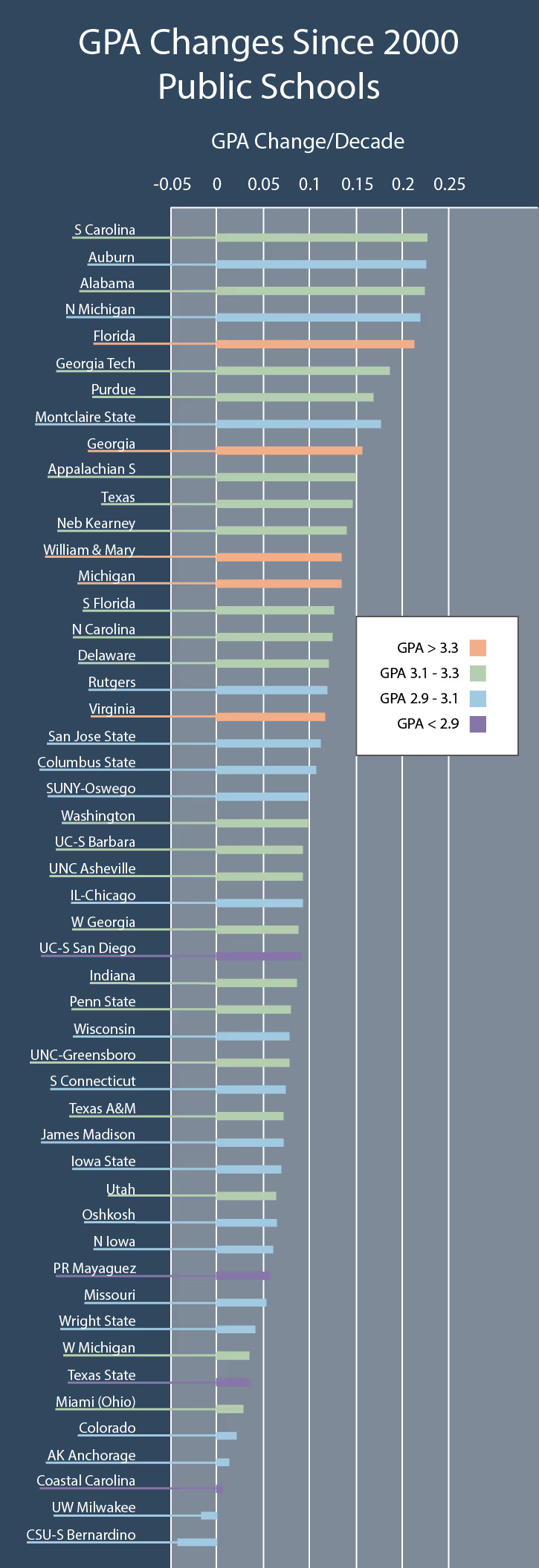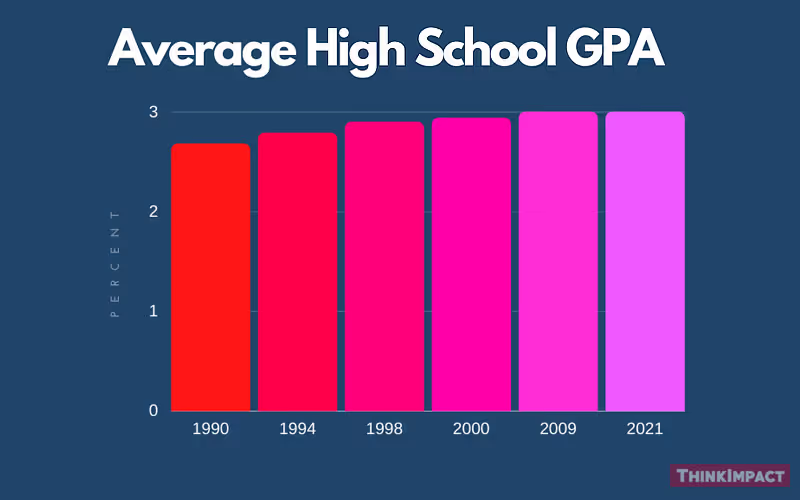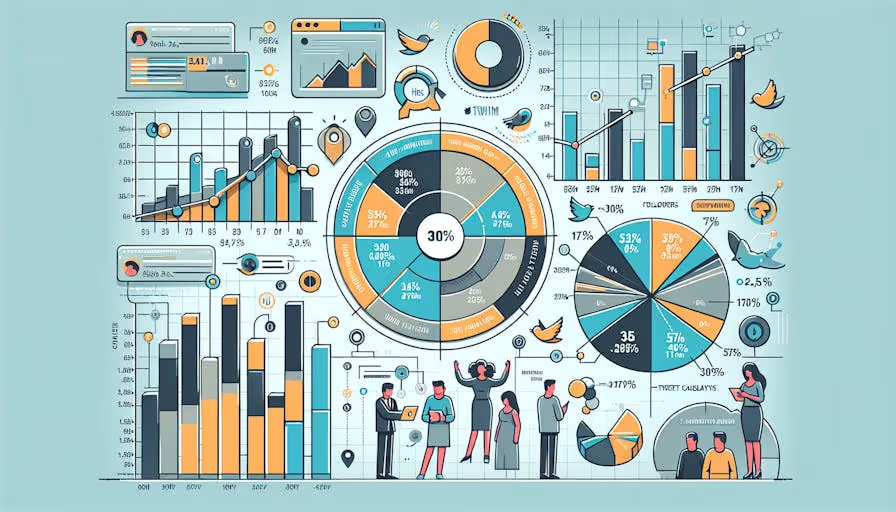Average GPA In High School & College (Statistics)
Did you know that the average high school GPA is around 3.0, or a B average? Learn about the average GPA in this roundup of GPA statistics.

Average GPA Statistics & Facts
- The average high school GPA is around 3.00, or a B average.
- Unless you're in a notoriously difficult major in college, anything below a 3.5 GPA is less likely to be regarded positively by potential employers.
- GPA plays a key role in college admissions.
- The average female GPA is 3.1, whereas males have an average GPA of 2.9.
- The average GPA for Black individuals is 2.69, Hispanic: 2.84, White: 3.09, Asian/Pacific: 3.26
- When it comes to students who had an ACT composite score of 12, high school GPA was 0.84 points higher than college GPA.
- High school GPA was 0.31 higher than college GPA for students who had an ACT composite of 34.
The following chart shows how letter and percentage grades correspond to a 4.0 GPA scale.
Average GPA In The U.S. By Year

What Is a Good GPA in High School?
The average high school GPA is around 3.0, or a B average, which also happens to be the minimum requirement for many college scholarships. The grade point average (GPA) was only 2.68 in 1990 and 2.94 in the year 2000.

GPA plays a key role in college admissions because your high school GPA is one of the few data-supported measurements of your academic abilities, lending objective evidence to a highly subjective admissions process.
Average GPA By Gender
It's worth noting that there are gender differences in average GPAs. According to a study by the National Center for Education Statistics, female high school students had an average GPA of 3.10, while male students had an average GPA of 2.90.
Similarly, in college, women tend to have higher GPAs than men on average.
While these statistics may be influenced by various factors such as course selection and individual effort, they do suggest that there may be systemic differences in academic performance between genders that warrant further examination and discussion.
It's important to consider these trends when evaluating the importance and impact of GPA on different individuals and communities.
Average GPA By Race
It's also important to consider the impact of race on GPA. According to data from the National Center for Education Statistics, there are significant differences in average GPAs by race.
In high school, Asian students had the highest average GPA at 3.52, followed by White students at 3.23, Hispanic students at 2.98, and Black students at 2.68. In college, Asian students continued to have the highest average GPA at 3.32, followed by White students at 3.17, Hispanic students at 2.88, and Black students at 2.52.
These statistics highlight the need for further examination of systemic factors that may contribute to differences in academic performance among different racial groups.
It is essential to address these disparities and work towards creating a more equitable educational system where all individuals have access to equal opportunities for academic success regardless of their race or ethnicity.
Understanding these statistics can also be helpful for individual students as they set goals and plan their academic careers.
By being aware of how their own academic performance compares to others within their racial group and across different groups, they can better assess their strengths and areas for improvement and make informed decisions about course selection, study habits, and other factors that can impact their GPA.
Overall, while GPA is just one measure of academic performance and should not be used as the sole determinant of success or potential, it remains an important factor in many aspects of education and career advancement.
By striving for a high GPA while also recognizing and addressing systemic barriers that may impact academic achievement differently across different groups, we can work towards creating a more inclusive and equitable educational system that benefits all individuals regardless of race or background.
Universities With The Highest Average GPAs
If you're aiming for a high GPA, it may be helpful to know which universities have the highest average GPAs. According to data from College Factual, here are the top 10 universities with the highest GPAs:
- Harvard University - 4.18
- Duke University - 4.15
- Stanford University - 4.11
- Princeton University - 4.00
- California Institute of Technology - 3.97
- Massachusetts Institute of Technology - 3.91
- Yale University - 3.89
- University of Pennsylvania - 3.89
- Brown University - 3.87
- Pomona College - 3.86
It's worth noting that these universities are highly selective and competitive, so achieving a high GPA at these institutions is no easy feat! However, if you're looking for a challenge and are determined to excel academically, attending one of these universities could be an excellent choice.
Of course, it's important to remember that GPA is just one factor to consider when choosing a university or evaluating your academic success; there are many other factors such as program offerings, location, cost, and campus culture that should also be taken into account.
That being said, if you're interested in attending one of these top-tier universities and achieving a high GPA, it's important to prioritize your education and develop strong study habits early on in your academic career.
By attending classes regularly, participating actively in class discussions, seeking help when needed, taking good notes, creating a study schedule and prioritizing your coursework effectively; you can increase your chances of academic success regardless of which university you attend.
Keep in mind that while GPA is important for certain career paths or graduate programs; ultimately what matters most is how well-rounded and prepared you are for life after graduation- both personally and professionally!
Highest Average High School GPA by State
Impact of High School GPA on your Income
According to research from the University of Miami, an increase in high school GPA affects the annual income of students by around 12% in men and 14% in women.
Does GPA Really Matter?
The question of whether GPA really matters is a common one among students. There are many opinions on the subject, but the answer ultimately depends on your goals and aspirations.
For some students, a high GPA is necessary to get into a competitive graduate program or to secure a coveted job after graduation.
In these cases, GPA can be a determining factor in whether or not you achieve your goals.
However, for other students, GPA may not be as important. If you are pursuing a career that does not require a specific GPA, such as entrepreneurship or the arts, then your GPA may not matter as much as your skills and experience.
That being said, even if your career path does not require a specific GPA, having a high GPA can still be beneficial.
A high GPA can demonstrate to potential employers or graduate programs that you are a hard worker and have good time management skills. It can also open up scholarship opportunities and make you more competitive for internships or other opportunities.
On the other hand, a low GPA can have negative consequences.
It can limit your options for graduate programs or jobs, and it can also make it more difficult to secure scholarships or other opportunities.
In conclusion, whether or not GPA matters depends on your individual goals and aspirations. While it may not be important for everyone, having a high GPA can still be beneficial in many ways.
It is important to prioritize your education and strive for academic success, but also to remember that GPA is not the only factor in determining your future success.
Tips For Raising Your GPA
If you're a high school student looking to improve your GPA, there are several things you can do to increase your chances of success. Here are some tips:
- Attend all classes: It may seem obvious, but simply attending all of your classes can have a huge impact on your GPA. You'll be able to learn the material and ask questions in real-time, which can help you better understand the subject matter.
- Participate in class: Being an active participant in class can also help boost your GPA. By asking questions and engaging with the material, you'll be better prepared for exams and assignments.
- Take good notes: Taking good notes can make studying for exams much easier. Make sure to write down key points and concepts, as well as any questions you have about the material.
- Create a study schedule: Developing a study schedule can help ensure that you stay on top of your coursework and don't fall behind. Set aside specific times each day or week for studying and completing assignments.
- Seek help when needed: If you're struggling with a particular subject or assignment, don't hesitate to seek help from your teacher or tutor. They can provide additional resources and guidance to help you succeed.
What Is GPA and How Is It Calculated?
GPA stands for Grade Point Average and is a measure of a student's academic performance. It is typically calculated on a scale from 0 to 4.0, with 4.0 being the highest possible GPA.
To calculate your GPA, each course you take is assigned a certain number of "grade points" based on the letter grade you receive. For example, an A may be worth 4 grade points, while a B is worth 3 grade points.
Once you have determined the total number of grade points earned across all courses, you divide that number by the total number of credits attempted to get your GPA.
It's important to note that different schools may use different grading scales or weight grades differently (such as giving extra weight to honors or AP courses). This can affect how your GPA is calculated and compared to other students.
Understanding how GPA works and how it is calculated can help you set realistic goals and make informed decisions about your academic career. By striving for a high GPA and implementing strategies for success, you can improve your chances of achieving your academic and career aspirations.
FAQs
What is a good high school GPA to get into college?
A good high school GPA to get into college depends on the specific college or university you are interested in attending. Generally, a GPA of 3.0 or higher is considered good and can make you competitive for many colleges and universities. However, more selective schools may require a higher GPA, such as a 3.5 or above.
It's important to keep in mind that GPA is just one factor that colleges consider when evaluating applications. Other factors such as extracurricular activities, essays, test scores, and letters of recommendation also play a role in the admissions process.
If you're aiming for a competitive college or university, it's important to maintain a high GPA while also focusing on other aspects of your application. This may include participating in extracurricular activities that align with your interests and goals, taking challenging courses (such as Advanced Placement or International Baccalaureate classes) to demonstrate academic rigor, and preparing thoroughly for standardized tests like the SAT or ACT.
By taking a well-rounded approach to your education and application process, you can increase your chances of being accepted into the college or university of your choice!
What is the highest GPA you can get?
The highest GPA you can get is typically a 4.0, which represents an A average across all courses taken. However, some schools may use different scales or weight grades differently, which can affect the maximum GPA possible. For example, some schools may give extra weight to honors or AP courses, which can result in a maximum GPA of higher than 4.0.
It's also worth noting that while achieving a perfect 4.0 GPA is impressive and can be beneficial for certain academic and career paths, it should not be the sole focus of one's education. It's important to prioritize learning and personal growth over simply striving for a high GPA. Additionally, many colleges and universities look beyond just a student's GPA when evaluating their application; factors such as extracurricular activities, essays, and letters of recommendation are also considered.
Ultimately, while having a high GPA can open up opportunities for academic and career success, it is just one aspect of an individual's overall potential and should not be viewed as the only measure of their abilities or accomplishments.
What is a good high school GPA to get into an Ivy League college?
If you're aiming to get into an Ivy League college, you'll need a high GPA along with other achievements and qualifications. Generally, the average GPA for admitted students at Ivy League schools is around 3.9 on a 4.0 scale. However, keep in mind that this is just an average, and some programs or schools may require a higher GPA or place more emphasis on other factors such as test scores or extracurricular activities.
In addition to achieving a high GPA, it's important to demonstrate academic rigor by taking challenging courses such as Advanced Placement (AP) or International Baccalaureate (IB) classes. Admissions committees at Ivy League schools also look for well-rounded applicants who have demonstrated leadership skills, community involvement, and a passion for learning.
Keep in mind that getting into an Ivy League school is highly competitive and requires dedication and hard work over many years. While having a high GPA can certainly help your chances of being admitted, it is just one aspect of your overall application package.
Other factors such as essays, test scores, letters of recommendation, and extracurricular activities are also important to consider when applying to top-tier universities like those in the Ivy League. By focusing on your strengths and pursuing your passions while also prioritizing academic excellence and personal growth, you can increase your chances of being accepted into the college of your dreams!
References
Recent News
Related articles
.avif)
100+ YouTube Statistics, Facts & Demographics
In 2023, YouTube has over 2.5 billion monthly active users.

39 Teacher Statistics And Demographics
Find the most up-to-date teacher demographics and statistics that'll surprise you.

Twitter Statistics for Social Media Enthusiasts [2024]
Explore compelling twitter statistics, user demographics, content engagement, and future predictions.
.avif)
89 TikTok Statistics, Facts & User Demographics
New TikTok statistics show that TikTok has quickly become one of the most popular social media platforms, with users spending an average of 52 minutes per day scrolling through videos.

Key Tinder Statistics You Need to Know
Dive into the world of Tinder statistics - revealing insights on user demographics, engagement, and global trends.
.avif)
49 Telehealth Statistics & Telemedicine Trends
Telehealth statistics show that the use of virtual care is 38 times higher than before the COVID-19 pandemic.

Teacher Salary By State: Highest-Paid Teachers By State
Today we'll breakdown a teacher's salary by state, as well as the highest-paid teachers by state.

121 Social Media Addiction Statistics Worldwide
Did you know that around 70% of teens and young adults in the US have a social media addiction?

57 Scholarship Statistics, Facts & Demographics
Did you know over 1.7 million scholarships are awarded annually? Keep reading to find more scholarship statistics.

Average Screen Time Statistics & Facts (Usage)
Did you know people spend 6 hours 58 minutes on screens everyday? Find more screen time statistics below.

59 Physical Therapy Statistics, Facts & Demographics
There are 578,565 people employed in the physical therapy industry in the US as of 2022. Find more physical therapy statistics and facts below.

Spotify Statistics: 79+ Intriguing Consumption Statistics in Music
Dive into the evolution of music with intriguing Spotify statistics; from user engagement to financial performance.

